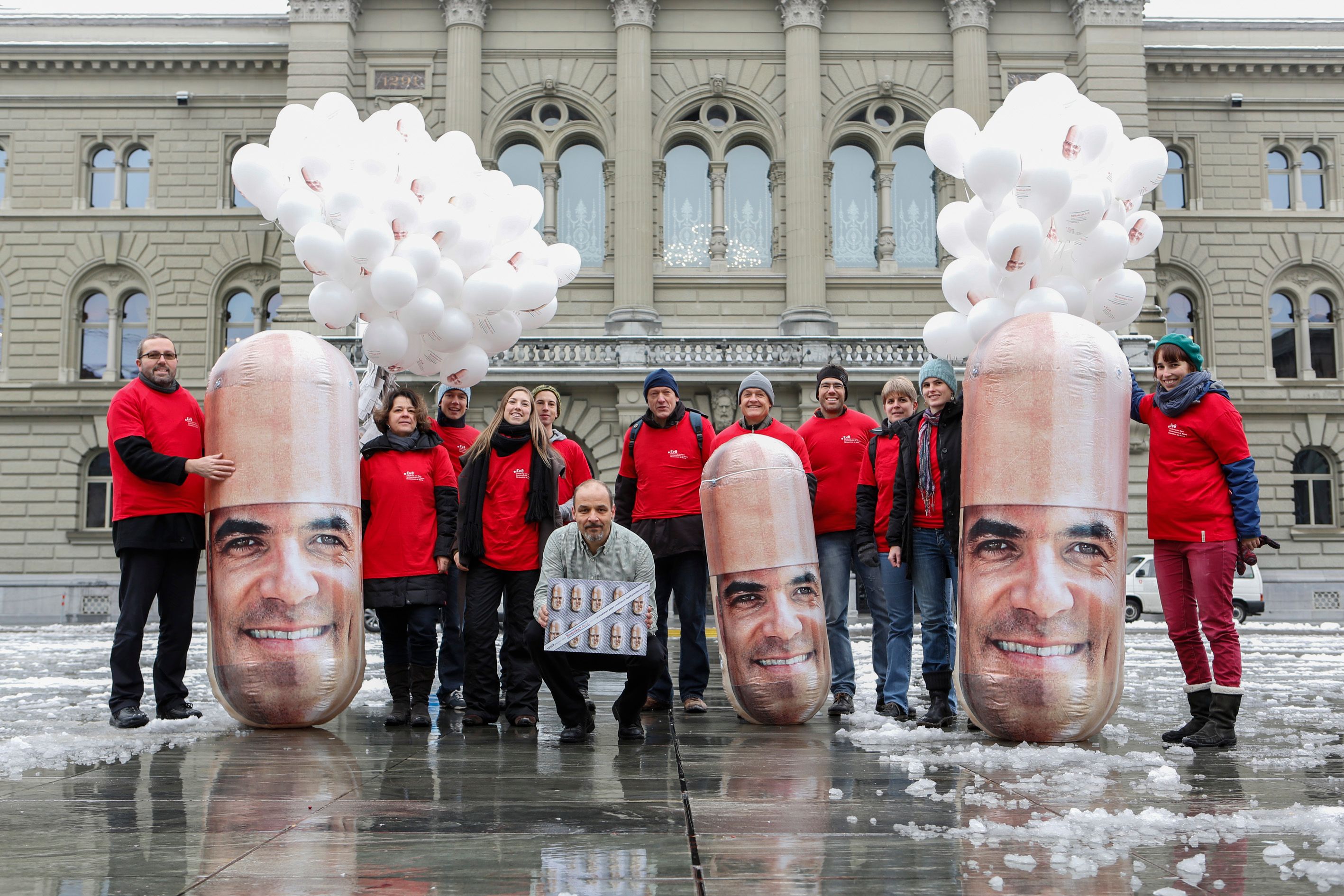Public Eye prescribes “Berseticum Forte” against unethical drug trials

Drug trials on humans are the most important, most delicate and, at the same time, most expensive part of pharmaceutical research and product development; this is why they are outsourced to lax-regulation “low-cost test countries”. In lower-income countries, recruiting “volunteers” is also much easier, because the only access they have to medication is often through participating in clinical trials.
The more drug trials that are outsourced to countries with lax controls, the greater the risk of lack of compliance with international ethical standards. Violations occur, for example, when obtaining consent, administering placebos improperly, discontinuing treatment prematurely after the end of the trial or with the lack of compensation for serious side effects. Investigations carried out by Public Eye in Argentina, Ukraine, Russia and India painted an alarming picture: in some cases, patients didn’t even know that their drugs were still in the testing phase.
Swissmedic, the Swiss Agency for Therapeutic Products, examines the safety and efficacy of medicines on the basis of clinical trials submitted by pharmaceutical companies for marketing authorization in Switzerland. However, this process is largely limited to scientific standards, instead of also ensuring that the rights of the trial participants have been respected and ethical guidelines have been observed during the trials. There is even less information released in public. Lack of transparency means that it is barely possible to carry out an independent review of trials carried out abroad that have been used for obtaining a marketing authorization in Switzerland.
Therefore, in the 2013 campaign, Public Eye called for Swissmedic’s Federal Council mandate to include in the future the systematic review of ethical standards for trials abroad. If these checks are not carried out, those affected are threatened with considerable health risks and Switzerland’s political reputation as a pharmaceutical location is also at risk. While the increased efforts to ensure greater transparency and apply more checks on ethical standards are slowly taking effect in the EU, Switzerland continues to have a wait-and-see approach.
The substance of the “Berseticum Forte” campaign was as follows:
Swissmedic should introduce retrospective ethical controls for clinical trials in lower-income countries that are used to obtain marketing authorization for medicines in Switzerland.
All drug trials, including those carried out abroad, which are used to obtain marketing authorization in Switzerland, should be recorded in the planned national register.
Swissmedic should publish all clinical study reports on the trials that are used as a basis for making marketing authorization decisions.
The pharmaceutical industry should not regard lower-income countries as experimental laboratories and abuse people as guinea pigs for the purpose of making profits.
Clinical trials should only be carried out abroad if the local population can actually benefit directly from their results.
Message sent by balloon to Berset: more than 13,000 signatures against unethical drug trials
Public Eye’s “Berseticum Forte” campaign definitely had an impact on the population. 13,017 citizens called on Health Minister Alain Berset to order the regulatory authority Swissmedic to impose stricter and more binding controls on clinical drug tests. When the petition was handed in, balloons, some with Berset’s face on them, were released into the sky with the message: It takes more than empty political ambitions to ensure that people in lower-income countries no longer become guinea pigs for pharmaceutical companies.

The two-month campaign helped the sensitive issue grab the attention of the Swiss public. The problem was recognized by various ethics institutes and some of them – such as the Cantonal Ethics Commission of the Canton of Zurich – supported measures aimed at remedying these grievances. In future, ethically questionable drugs should no longer be allowed in circulation on the Swiss market and in this sensitive business area for pharmaceutical companies, greater transparency and more regulatory control are required.
What impact has the “Berseticum Forte” campaign had?
As a result of Public Eye’s campaign, talks were initiated between the Federal Council and the regulatory authority, which included, for instance, Alain Berset giving his response to a parliamentary question. An interpellation on this question was answered in the National Council during the 2013 winter session of the Federal Council.
The revision of the Therapeutic Products Act (TPA) and the corresponding ordinances created a legal basis for carrying out inspections abroad (TPA Art. 64a). Pharmaceutical companies must also submit a self-declaration and draw up a risk management plan stating that the studies on humans have been carried out in accordance with the recognized rules of “Good Practice in Clinical Trials” and “Good Vigilance Practice” (Therapeutic Products Licensing Requirements Ordinance, Art. 5; Art. 5a). However, this self-declaration is not published and the risk management plan, the summary which is available for public access, does not contain any criteria to prove that trial participants are afforded protection and the clinical trials abroad are conducted in an ethical manner. Inspections carried out abroad are primarily intended to guarantee production quality. If trials are carried out within a lax regulatory framework, Swissmedic cannot afford to make its judgement solely on the basis of information provided by pharmaceutical companies. Of course, these companies have no interest in investigating ethical deficits in clinical trials.
A study conducted by Public Eye in 2019 shows that access to treatments tested abroad (“post-trial access”) is not guaranteed for the local population. Although pharmaceutical companies are increasingly applying for their authorization, they remain unaffordable for most people due to their high prices.
Therefore, some progress has been made, but the practices of pharmaceutical companies in conducting clinical trials abroad and regulation, control and sanctions for authorization in Switzerland are still inadequate, and Public Eye continues to advocate for the rights of trial participants all over the world.

